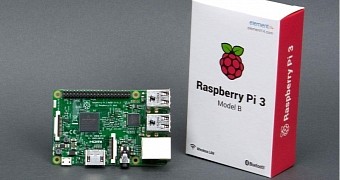Microsoft has announced that Windows 10 IoT Core is now available with the Anniversary Update, which brings a long list of improvements, new features, and support for more devices and apps.
First and foremost, the most notable change is that, with the Anniversary Update, Windows 10 IoT Core is now officially available for the Raspberry Pi 3, providing a super simple getting started experience, as well as functional parity with Raspberry Pi 2.
The slimmed-down version of Windows 10 specifically created for development boards also works on Dragonboard 410c and Minnowboard Max, and thanks to the Anniversary Update, it gets support for NOOBS 8GB cards, shell capabilities, Arduino INO integration, and support for the Windows Store, which allows Windows 10 IoT Core to connect to the store and service applications.
Launched one year ago
Windows 10 IoT Core was officially launched in August 2015 in order to give developers the necessary tools to enhance their development boards, which can then be used for creating smart devices that can benefit from the power of Windows 10.
“The developer experience has been a high priority for our team as we’ve built Windows 10 IoT Core, and we hope this shows when constructing apps for this platform. Our philosophy is that we want to make it easy for developers to use the languages and frameworks they prefer to build IoT device apps,” Microsoft explained at the time of launch, pointing out that developers were one of the priorities when work on IoT Core started.
The release notes for Windows 10 IoT Core build 14393 (preview version) are huge, and you can check them out here, but keep in mind that some of the bugs mentioned in the known issues list might have already been fixed in the final version of the operating system.
Otherwise, the new features list and the release notes provide plenty of information for developers who want to install Windows 10 on the development boards, no matter if it’s a Raspberry Pi 3 or any other of the supported devices.

 14 DAY TRIAL //
14 DAY TRIAL //